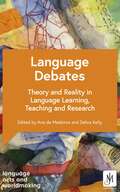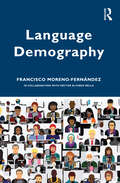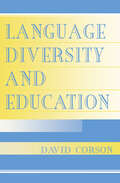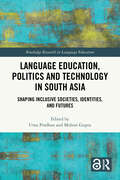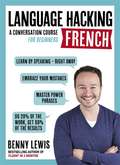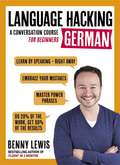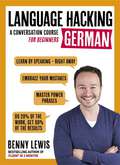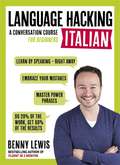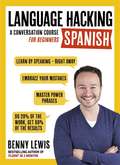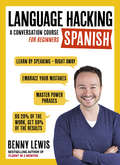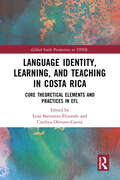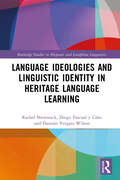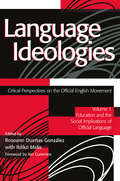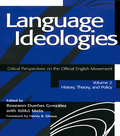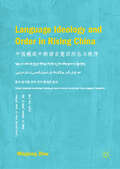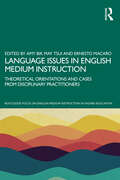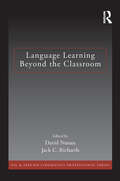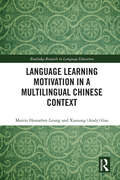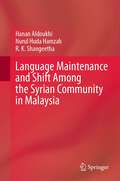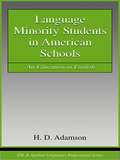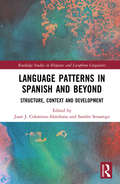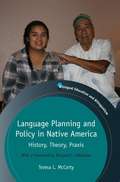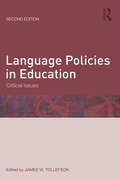- Table View
- List View
Language Debates: Theory and Reality in Language Learning, Teaching and Research (Language Acts and Worldmaking #1)
by VariousThis book captures an urgent moment for language teaching, learning and research. At its core are a series of debates concerning gender stereotyping, the place of linguistics in modern languages, language activism, multilingualism and modern languages and digital humanities. Taken together, these debates explore the work that languages, and that those who learn and speak them, do in the world as well as the way we think 'through' and 'in' a language and are shaped by it. Language Debates acknowledges the history of language teaching and the current realities of language teaching and learning. It is bold in suggesting ways forward for reform and for policy, setting languages and language learning at the heart of a consciously transformative set of goals. This book is therefore essential reading for academics, language teachers, policy makers, students, activists and those passionate about progressing language learning and teaching. The editors and contributors make up a multilingual and multicultural team who work across languages, cultures and borders with a globally-informed approach to their work. Uniquely, the debates in this volume are based on events with participants in the Language Acts and Worldmaking Debates Series and/or workshops within the wider research project and take into account the ensuing discussions there. Each debate is accompanied by an interview which serves as a model on how to continue the conversation beyond the printed pages of the book. You can also discover ways to join the debate through links on the Language Acts and Worldmaking series website (www.jmlanguages.com/languageacts) which includes recorded debates, additional materials and more information about the series. Like all the volumes in the Language Acts and Worldmaking series, the overall aim is two-fold: to challenge widely-held views about language learning as a neutral instrument of globalisation and to innovate and transform language research, teaching and learning, together with Modern Languages as an academic discipline, by foregrounding its unique form of cognition and critical engagement. Specific aims are to:· propose new ways of bridging the gaps between those who teach and research languages and those who learn and use them in everyday contexts from the professional to the personal· put research into the hands of wider audiences · share a philosophy, policy and practice of language teaching and learning which turns research into action· provide the research, experience and data to enable informed debates on current issues and attitudes in language learning, teaching and research· share knowledge across and within all levels and experiences of language learning and teaching· showcase exciting new work that derives from different types of community activity and is of practical relevance to its audiences · disseminate new research in languages that engages with diverse communities of language practitioners.
Language Demography
by Francisco Moreno-FernándezLanguage Demography presents, exemplifies, and develops linguistic concepts involved in demography and the demographic concepts involved in sociolinguistics. The first introductory guide of its kind, it is presented in a way that is accessible to non-specialists. The book includes numerous examples of the sources and types of data used in this field, as well as the various factors affecting language demography. Taking a global perspective supported by examples, it gives explanations of how demolinguistic analyses are performed and their main applications in relation to minority and majority languages. Language Demography will be of interest to students from a range of disciplinary backgrounds, from linguistics and modern languages to sociology, anthropology, and human geography.
Language Diversity and Education
by David CorsonThis introductory text for students of linguistics, language, and education provides background and up-to-date information and resources that beginning researchers need for studying language diversity and education. Three framing chapters offer an update on the philosophy of social research, revealing how important language is for all the processes of learning in which humans engage, whether it is learning about the world through education, or learning about the nature of social life through research in the human sciences. These chapters also review the links between language, power, and social justice, and look at dynamic changes occurring in "language diversity and education" research. Four central chapters give state-of-the-art, comprehensive coverage to the chief areas of language diversity that affect the practice of education: standard and non-standard varieties; different cultural discourse norms; bilingual and ESL education; and gendered discourse norms. This book is intended for graduate students of applied linguistics, sociolinguistics, psycholinguistics, the social psychology of language, anthropological linguistics, and other related disciplines; and graduate students of education, including in-service teachers taking advanced professional development courses. Special features enhance its usefulness as a text for courses in these areas: * A clear, jargon free writing style invites careful reading. * All ideas are well within the range that graduate students in the language disciplines or in education can relate to their work, but theoretical ideas are kept to a necessary minimum and linked with practical examples in every case. * Extensive references guide readers to the book's up-to-date, international, and cross-cultural bibliography. * "Discussion Starter" questions at the end of each chapter highlight key points and stimulate informed, reflective discussion.
Language Dominance in Bilinguals
by Carmen Silva-CorvalánWith contributions from leading scholars of bilingualism, Language Dominance in Bilinguals is the first publication to survey different approaches to language dominance, along with suggested avenues for further research. It illustrates how a critical approach to the notion of language dominance, as well as its operationalisation and measurement, can provide new insights into this burgeoning area of research. Drawing on adult and child data from a variety of language pairs, the chapters discuss how language dominance is to be conceptualised and distinguished from such related constructs as language proficiency and language competence. This volume is the first of its kind to present an overview of different approaches to language dominance from across the theoretical spectrum, as well as suggested avenues for further research. Accessibly written, Language Dominance in Bilinguals is a valuable new addition to the field and essential reading for students and scholars working in bilingualism, speech therapy and education.
Language Education, Politics and Technology in South Asia: Shaping Inclusive Societies, Identities, and Futures (Routledge Research in Language Education)
by Uma Pradhan Mohini GuptaBringing together research from the fields of linguistics, education and technology within the dynamic context of South Asia, this timely book investigates the ways in which these fields interact with each other against the backdrop of technological innovation, linguistic diversity and socio-political transformation.Developing and expanding on findings and insights originating from a conference organised by the Education South Asia Initiative at the University of Oxford, this interdisciplinary book features academic reflections on language politics and diversity as well as empirical insights on linguistic, educational and technological transformations in the region. Featuring analytical and methodological approaches to the study of language and education, chapters range in context from India, Bangladesh, Nepal, Pakistan and Sri Lanka, and address a range of issues such as the marginalisation of languages in education and policy, the interactions between language and social hierarchies in the South Asian context, and technology’s impact on language education, acquisition, usage and preservation.Ultimately initiating dialogue on the need for positive changes in language, education research and policy, this book will appeal to scholars, researchers and postgraduate students in the fields of language education, international and comparative education, and education and technology. Policymakers in international development and sociolinguistics may also find the volume of use.The Open Access version of this book, available at http://www.taylorfrancis.com, has been made available under a Creative Commons Attribution-Non Commercial-No Derivatives (CC BY-NC-ND) 4.0 license.
Language Hacking French (Languag Hacking with Benny Lewis)
by Benny LewisIt's true that some people spend years studying French before they finally get around to speaking the language. But here's a better idea. Skip the years of study and jump right to the speaking part. Sound crazy? No, it's language hacking. Unlike most traditional language courses that try to teach you the rules of French, #LanguageHacking shows you how to learn and speak French through proven memory techniques, unconventional shortcuts and conversation strategies perfected by one of the world's greatest language learners, Benny Lewis, aka the Irish Polyglot. Using the language hacks -shortcuts that make learning simple - that Benny mastered while learning his 11 languages and his 'speak from the start' method, you will crack the language code and exponentially increase your language abilities so that you can get fluent faster. It's not magic. It's not a language gene. It's not something only "other people" can do. It's about being smart with how you learn, learning what's indispensable, skipping what's not, and using what you've learned to have real conversations in French from day one.The Method #LanguageHacking takes a modern approach to language learning, blending the power of online social collaboration with traditional methods. It focuses on the conversations that learners need to master right away, rather than presenting language in order of difficulty like most courses. This means that you can have conversations immediately, not after years of study. Each of the 10 units culminates with a speaking 'mission' that prepares you to use the language you've learned to talk about yourself. Through the language hacker online learner community, you can share your personalized speaking 'missions' with other learners - getting and giving feedback and extending your learning beyond the pages of the book . You don't need to go abroad to learn a language any more.
Language Hacking German (Languag Hacking with Benny Lewis)
by Benny LewisIt's true that some people spend years studying German before they finally get around to speaking the language. But here's a better idea. Skip the years of study and jump right to the speaking part. Sound crazy? No, it's language hacking. Unlike most traditional language courses that try to teach you the rules of German, #LanguageHacking shows you how to learn and speak German through proven memory techniques, unconventional shortcuts and conversation strategies perfected by one of the world's greatest language learners, Benny Lewis, aka the Irish Polyglot. Using the language hacks -shortcuts that make learning simple - that Benny mastered while learning his 11 languages and his 'speak from the start' method, you will crack the language code and exponentially increase your language abilities so that you can get fluent faster. It's not magic. It's not a language gene. It's not something only "other people" can do. It's about being smart with how you learn, learning what's indispensable, skipping what's not, and using what you've learned to have real conversations in German from day one.The Method #LanguageHacking takes a modern approach to language learning, blending the power of online social collaboration with traditional methods. It focuses on the conversations that learners need to master right away, rather than presenting language in order of difficulty like most courses. This means that you can have conversations immediately, not after years of study. Each of the 10 units culminates with a speaking 'mission' that prepares you to use the language you've learned to talk about yourself. Through the language hacker online learner community, you can share your personalized speaking 'missions' with other learners - getting and giving feedback and extending your learning beyond the pages of the book . You don't need to go abroad to learn a language any more.
Language Hacking German (Language Hacking)
by Benny LewisIt's true that some people spend years studying German before they finally get around to speaking the language. But here's a better idea. Skip the years of study and jump right to the speaking part. Sound crazy? No, it's language hacking. Unlike most traditional language courses that try to teach you the rules of German, #LanguageHacking shows you how to learn and speak German through proven memory techniques, unconventional shortcuts and conversation strategies perfected by one of the world's greatest language learners, Benny Lewis, aka the Irish Polyglot. Using the language hacks -shortcuts that make learning simple - that Benny mastered while learning his 11 languages and his 'speak from the start' method, you will crack the language code and exponentially increase your language abilities so that you can get fluent faster. It's not magic. It's not a language gene. It's not something only "other people" can do. It's about being smart with how you learn, learning what's indispensable, skipping what's not, and using what you've learned to have real conversations in German from day one.The Method #LanguageHacking takes a modern approach to language learning, blending the power of online social collaboration with traditional methods. It focuses on the conversations that learners need to master right away, rather than presenting language in order of difficulty like most courses. This means that you can have conversations immediately, not after years of study. Each of the 10 units culminates with a speaking 'mission' that prepares you to use the language you've learned to talk about yourself. Through the language hacker online learner community, you can share your personalized speaking 'missions' with other learners - getting and giving feedback and extending your learning beyond the pages of the book . You don't need to go abroad to learn a language any more.
Language Hacking Italian (Languag Hacking with Benny Lewis)
by Benny LewisIt's true that some people spend years studying Italian before they finally get around to speaking the language. But here's a better idea. Skip the years of study and jump right to the speaking part. Sound crazy? No, it's language hacking. Unlike most traditional language courses that try to teach you the rules of Italian, #LanguageHacking shows you how to learn and speak Italian through proven memory techniques, unconventional shortcuts and conversation strategies perfected by one of the world's greatest language learners, Benny Lewis, aka the Irish Polyglot. Using the language hacks -shortcuts that make learning simple - that Benny mastered while learning his 11 languages and his 'speak from the start' method, you will crack the language code and exponentially increase your language abilities so that you can get fluent faster. It's not magic. It's not a language gene. It's not something only "other people" can do. It's about being smart with how you learn, learning what's indispensable, skipping what's not, and using what you've learned to have real conversations in Italian from day one. The Method #LanguageHacking takes a modern approach to language learning, blending the power of online social collaboration with traditional methods. It focuses on the conversations that learners need to master right away, rather than presenting language in order of difficulty like most courses. This means that you can have conversations immediately, not after years of study. Each of the 10 units culminates with a speaking 'mission' that prepares you to use the language you've learned to talk about yourself. Through the language hacker online learner community, you can share your personalized speaking 'missions' with other learners - getting and giving feedback and extending your learning beyond the pages of the book . You don't need to go abroad to learn a language any more.
Language Hacking Spanish (Languag Hacking with Benny Lewis)
by Benny LewisIt's true that some people spend years studying Spanish before they finally get around to speaking the language. But here's a better idea. Skip the years of study and jump right to the speaking part. Sound crazy? No, it's language hacking. Unlike most traditional language courses that try to teach you the rules of Spanish, #LanguageHacking shows you how to learn and speak Italian through proven memory techniques, unconventional shortcuts and conversation strategies perfected by one of the world's greatest language learners, Benny Lewis, aka the Irish Polyglot. Using the language hacks -shortcuts that make learning simple - that Benny mastered while learning his 11 languages and his 'speak from the start' method, you will crack the language code and exponentially increase your language abilities so that you can get fluent faster. It's not magic. It's not a language gene. It's not something only "other people" can do. It's about being smart with how you learn, learning what's indispensable, skipping what's not, and using what you've learned to have real conversations in Spanish from day one.The Method #LanguageHacking takes a modern approach to language learning, blending the power of online social collaboration with traditional methods. It focuses on the conversations that learners need to master right away, rather than presenting language in order of difficulty like most courses. This means that you can have conversations immediately, not after years of study. Each of the 10 units culminates with a speaking 'mission' that prepares you to use the language you've learned to talk about yourself. Through the language hacker online learner community, you can share your personalized speaking 'missions' with other learners - getting and giving feedback and extending your learning beyond the pages of the book . You don't need to go abroad to learn a language any more.
Language Hacking Spanish: A Conversation Course For Beginners (Language Hacking)
by Benny LewisIt's true that some people spend years studying Spanish before they finally get around to speaking the language. But here's a better idea. Skip the years of study and jump right to the speaking part. Sound crazy? No, it's language hacking. Unlike most traditional language courses that try to teach you the rules of Spanish, #LanguageHacking shows you how to learn and speak Italian through proven memory techniques, unconventional shortcuts and conversation strategies perfected by one of the world's greatest language learners, Benny Lewis, aka the Irish Polyglot. Using the language hacks -shortcuts that make learning simple - that Benny mastered while learning his 11 languages and his 'speak from the start' method, you will crack the language code and exponentially increase your language abilities so that you can get fluent faster. It's not magic. It's not a language gene. It's not something only "other people" can do. It's about being smart with how you learn, learning what's indispensable, skipping what's not, and using what you've learned to have real conversations in Spanish from day one.The Method #LanguageHacking takes a modern approach to language learning, blending the power of online social collaboration with traditional methods. It focuses on the conversations that learners need to master right away, rather than presenting language in order of difficulty like most courses. This means that you can have conversations immediately, not after years of study. Each of the 10 units culminates with a speaking 'mission' that prepares you to use the language you've learned to talk about yourself. Through the language hacker online learner community, you can share your personalized speaking 'missions' with other learners - getting and giving feedback and extending your learning beyond the pages of the book . You don't need to go abroad to learn a language any more.
Language Identity, Learning, and Teaching in Costa Rica: Core Theoretical Elements and Practices in EFL (Global South Perspectives on TESOL)
by Lena Barrantes-Elizondo Cinthya Olivares-GaritaThis edited collection provides a comprehensive and locally situated understanding of English language teaching from the perspective of dedicated and experienced language professionals and researchers in Costa Rica. The book uses a series of reflective sections that interconnect theory and practice in a non-English-dominant context in order to inform and transform pedagogical practices. The chapters depict a wide-ranging image of English language teaching and learning in the region, encouraging in-service teachers, TESOL specialists, and ELT scholars to critically reassess, rethink, and relearn teaching and learning as more than a political decision in an educational curriculum. Ultimately promoting the practice as dynamic, ever-changing, and culturally situated, the book will be highly relevant to researchers, academics, scholars, and faculty in the fields of teacher education, educational research, EFL, and modern foreign languages.
Language Ideologies and Linguistic Identity in Heritage Language Learning (Routledge Studies in Hispanic and Lusophone Linguistics)
by Rachel Showstack Diego Pascual y Cabo Damián Vergara WilsonLanguage Ideologies and Linguistic Identity in Heritage Language Learning addresses the ways in which discourses about language value and identities of linguistic expertise are constructed and negotiated in the Spanish heritage language (HL) classroom, and how the classroom discourse shapes, and is shaped by, the world outside of the classroom.The volume examines the sociopolitical contexts, personal histories, and communicative practices of Spanish teachers and students in two diverse geographic regions: the US states of Texas and Kansas. Adopting an integrated sociocultural approach, it considers the ways in which individuals draw from multiple linguistic resources and social practices in daily interaction and how they articulate their beliefs about language through storytelling. Rich interactional data, examples from social media, and stories of community engagement are utilized to demonstrate how Spanish heritage speakers use language creatively and proactively to legitimize and claim power in their home and community linguistic practices.This is an invaluable resource for applied linguists who seek to better understand the relationship between language, ideology, and identity and for graduate students and researchers in the fields of linguistics, Spanish, and HL education.
Language Ideologies: Critical Perspectives on the Official English Movement, Volume I: Education and the Social Implications of Official Language
by ROSEANN DUEÑAS GONZÁLEZ; ILDIKÓ MELISHow do educators balance the rights of the rapidly growing percentage of the United States' population whose first language is not English or whose English differs from standard usage with the rights of the majority of students whose first and generally only language is English? This two-volume set addresses the complicated and divisive issues at the heart of the debate over language diversity and the English Only movement in the U.S. public education. Blending social, political, and legal analyses of the ideologies of language with perspectives on the impact of the English Only movement on education and on classrooms at all levels, Language Ideologies: Critical Perspectives on the Official English Movement offers a wide range of perspectives that teachers and literacy advocates can use to inform practice as well as policy. This exhaustive, two-volume collection not only updates existing information on the English Only movement in the United States, but also includes the international context, looking at the emergence of English as a world language through a postcolonial lens. The complexity of the debate is also reflected in the exceptionally diverse list of contributors, who speak from varying disciplines and backgrounds including sociology, linguistics, university administration, the ACLU, law, ESL, and English. Both volumes explore the political, legislative, and social implications of language ideologies. Volume 1: Education and the Social Implications of Official Language focuses in particular on the consequences for the classroom. In Volume 2: History, Theory, and Policy, the focus is on the implications for policymakers and language-program administrators.
Language Ideologies: Critical Perspectives on the Official English Movement, Volume II: History, Theory, and Policy
by Roseann Dueñas González Ildikó MelisFirst published in 2001. Routledge is an imprint of Taylor & Francis, an informa company.
Language Ideology and Order in Rising China
by Minglang ZhouThis text considers contemporary China’s language ideology and how it supports China as a rising global power player. It examines the materialization of this ideology as China’s language order unfolds on two front, promoting Putonghua domestically and globally, alongside its economic growth and military expansion. Within the conceptual framework of language ideology and language order and using PRC policy documents, education annals, and fieldwork, this book explores how China’s language ideology is related to its growing global power as well as its domestic and global outreaches. It also addresses how this ideology has been materialized as a language order in terms of institutional development and support, and what impact these choices are having on China and the world. Focusing on the relationship between language ideology and language order, the book highlights a closer and coherent linguistic association between China’s domestic drive and global outreach since the turn of the century.
Language Issues in English Medium Instruction: Theoretical Orientations and Cases from Disciplinary Practitioners (Routledge Focus on English-Medium Instruction in Higher Education)
by Ernesto Macaro Amy Bik May TsuiTsui and Macaro's volume addresses a central issue in English Medium Instruction (EMI) and draws on research and practice from both content teachers and language specialists.It covers a range of academic disciplines and contains contributions by internationally recognized researchers and practitioners in EMI, as well as covering both the theoretical orientations and pedagogical practices of EMI. The chapters provide an in-depth account of how language needs to be integrated into the various academic subjects being taught through the medium of English in higher education in non-anglophone countries. Its contributors are either second language specialists or teachers directly responsible for teaching in the different disciplines. The book calls for much greater collaboration between these actors and for a sense of shared responsibility for ensuring that English Medium Instruction, a phenomenon that is now established worldwide, is successful for all students.It will be of interest to students, researchers and teachers of English Medium Instruction in both secondary and higher education.
Language Learning Beyond the Classroom (ESL & Applied Linguistics Professional Series)
by Jack C. Richards David NunanThis volume presents case studies of language learning beyond the classroom. The studies draw on a wide range of contexts, from North and South America to Europe and the Asia-Pacific region. Each provides principled links between theory, research and practice. While out-of-class learning will not replace the classroom, ultimately all successful learners take control of their own learning. This book shows how teachers can help learners bridge the gap between formal instruction and autonomous language learning. Although English is the primary focus of most chapters, there are studies on a range of other languages including Spanish and Japanese.
Language Learning Motivation in a Multilingual Chinese Context (Routledge Research in Language Education)
by Xuesong (Andy) Gao Mairin Hennebry-LeungDrawing on quantitative and qualitative data from teachers and students in Hong Kong’s secondary schools, this book examines critical questions in relation to language learning motivation and instructional contexts. Readers are provided with a critical overview of developments in theory and research on language learning motivation and the potential to further extend these developments. Grounded in the Douglas Fir Group conceptualization of language learning, the book explores the complex interplay of diverse factors that shape learners’ motivation. It offers a unique window into the situated nature of language learning motivation in the macro, meso, and micro contexts of a Chinese heritage society. In so doing, it brings the Chinese voice into the theorization of this important language learning construct. Potential future research avenues are suggested, and implications for policy and practice are discussed. This book will be a useful resource for academics and postgraduates interested in the fields of English as a second language (ESL), English language teaching, language teaching and learning.
Language Maintenance and Shift Among the Syrian Community in Malaysia
by Hanan Aldoukhi Nurul Huda Hamzah R. K. ShangeethaThis book investigates language choices in different domains among Syrian Arab Muslim families who came to Malaysia after war broke out in their country. It focuses on how Syrian Heritage Language (HL), Modern Standard Arabic (MSA), Classical Arabic (CA), and other languages that might be spoken by these families were maintained and/or shifted from the time these families came to Malaysia until the lockdown due to the COVID-19 pandemic. Most works on Syrian community in Malaysia are focused on social and humanitarian issues; none has explored how Syrians in Malaysia are managing their language use in connection with day-to-day communication and integration. As the Syrian community in Malaysia adapts by learning the host language, their mother language/s might experience a shift. The way the minority communities view their mother language by prioritizing or deprioritizing its use in the family milieu are factors that contribute to language maintenance and language shift (LMLS). As such, this book provides insights on how Syrian parents are managing their own and their children’s language/s, along with the language of the host country.
Language Minority Students in American Schools: An Education in English (ESL & Applied Linguistics Professional Series)
by H. D. AdamsonThis book addresses questions of language education in the United States, focusing on how to teach the 3.5 million students in American public schools who do not speak English as a native language. These students are at the center of a national debate about the right relationship among ESL, bilingual, and mainstream classes. Bilingual education has been banned by constitutional amendment in California and Arizona, and similar amendments are being considered in other states. Language Minority Students in American Schools: An Education in English places this debate and related issues of teaching standard English to speakers of nonstandard dialects, such as black English, within the larger context of language acquisition theory and current methods of language teaching. Adamson draws from the large body of sociolinguistic, psycholinguistic, and educational research, and on his own experience as an English teacher in the U.S. and overseas, to shed light on some of these controversies and on the cognitive, cultural, public policy, and practical issues involved in educating English language learners. Presenting all sides of the issues fairly, he offers a strong endorsement for bilingual and bidialectical education based on programs designed and administered according to the principles discussed in the book and supported by language acquisition theory and classroom research. A strength of the book is the inclusion of original research conducted in a middle school enrolling a majority of Latino students. This research contributes to the field of language education by providing a detailed description of how English language learners study content subjects. Examples from the study are used to illustrate a discussion of Vygotskian learning principles and the relationship between the students' home and school cultures. Language Minority Students in American Schools: An Education in English is intended for students who are preparing to become teachers of English as a second language, and for teachers of other subjects who work with English language learners.
Language Patterns in Spanish and Beyond: Structure, Context and Development (Routledge Studies in Hispanic and Lusophone Linguistics)
by Juan J. Colomina-AlmiñanaThe scholarly articles included in this volume represent significant contributions to the fields of formal and descriptive syntax, conversational analysis and speech act theory, as well as language development and bilingualism. Taken together, these studies adopt a variety of methodological techniques—ranging from grammaticality judgments to corpus-based analysis to experimental approaches—to offer rich insights into different aspects of Ibero-Romance grammar. The volume consists of three parts, organized in accordance with the topics treated in the chapters they comprise. Part I focuses on structural patterns, Part II analyzes pragmatic ones, and Part III investigates the acquisition of linguistic aspects found in the speech of L1, L2 and heritage speakers. The authors address these issues by relying on empirically rooted linguistic approaches to data collection, which are coupled with current theoretical assumptions on the nature of sentence structure, discourse dynamics and language acquisition. The volume will be of interest to anyone researching or studying Hispanic and Ibero-Romance linguistics.
Language Planning and National Identity in Croatia
by Keith Langston Anita Peti-StantićFollowing the collapse of the former Yugoslavia, Croatian was declared to be a separate language, distinct from Serbian, and linguistic issues became highly politicized. This book examines the changing status and norms of the Croatian language and its relationship to Croatian national identity, focusing on the period after Croatian independence.
Language Planning and Policy in Native America
by Teresa L. MccartyComprehensive in scope and rich in detail, this book explores language planning, language education, and language policy for diverse Native American peoples across time, space, and place. Based on long-term collaborative and ethnographic work with Native American communities and schools, the book examines the imposition of colonial language policies against the fluorescence of contemporary community-driven efforts to revitalize threatened mother tongues. Here, readers will meet those who are on the frontlines of Native American language revitalization every day. As their efforts show, even languages whose last native speaker is gone can be reclaimed through family-, community-, and school-based language planning. Offering a critical-theory view of language policy, and emphasizing Indigenous sovereignties and the perspectives of revitalizers themselves, the book shows how language regenesis is undertaken in social practice, the role of youth in language reclamation, the challenges posed by dominant language policies, and the prospects for Indigenous language and culture continuance current revitalization efforts hold.
Language Policies in Education: Critical Issues
by James W. TollefsonHow do language policies in schools create inequalities among learners? How do policies marginalize some students while granting privilege to others? How do language policies in education serve the interests of dominant groups within societies? How can linguistic minorities further their interests through attempts to change language policies in schools? This new edition of Language Policies in Education takes a fresh look at these enduring questions at the heart of fundamental debates about the role of schools in society, the links between education and employment, and conflicts between linguistic minorities and "mainstream" populations. Reflecting developments in language policy since the publication of the first edition in 2002, all chapters are original and substantial contributions to the study of language policy and exemplify major theories and research methods in the field. Chapter authors are major scholars in language policy and critical language studies. The case studies, international in scope, present cutting-edge analyses of important language policy debates in countries around the world.
